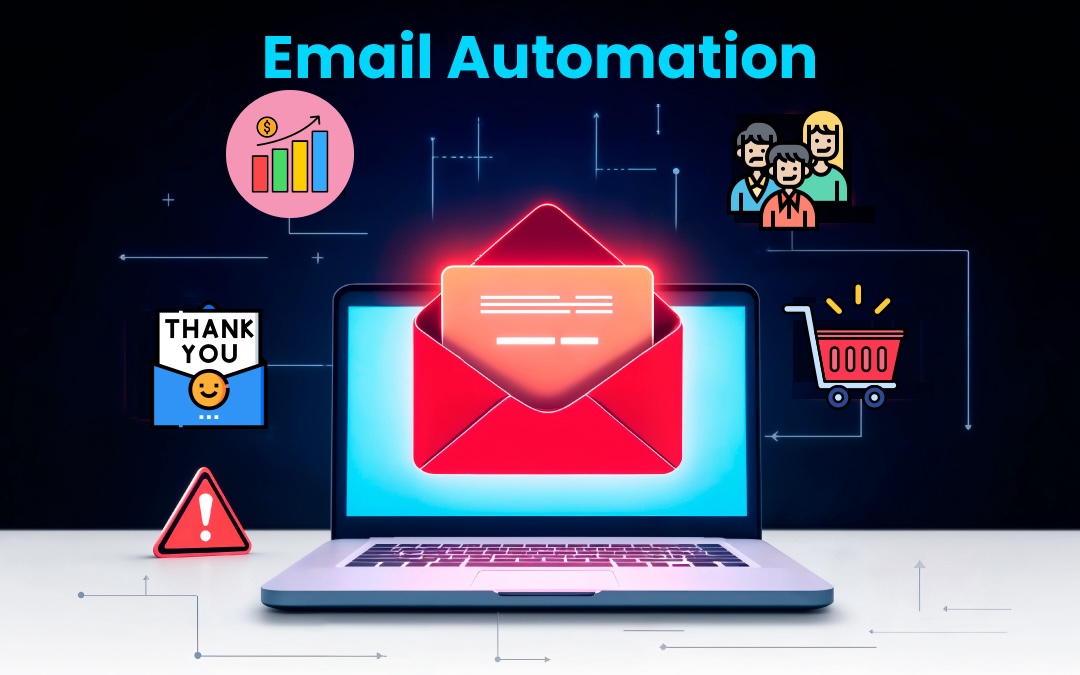
Email automation involves using software to send emails based on predefined triggers or schedules. Unlike manual email campaigns, automation allows businesses to nurture leads, engage customers, and streamline communication without constant manual effort.
A study by Campaign Monitor found that automated emails generate 320% more revenue than non-automated emails, highlighting the impact of this technology.
Benefits of Email Automation for Small Businesses
1. Enhanced Efficiency
Automation saves time and reduces the need for manual input, allowing small business owners to focus on other critical aspects of their operations. For instance:
- Automatically sending welcome emails to new subscribers.
- Triggering post-purchase follow-ups to gather feedback.
2. Improved Customer Engagement
Personalized communication builds trust, customer brand loyalty and fosters relationships. Automation enables businesses to deliver tailored messages at the right time, such as:
- Birthday or anniversary emails with special offers.
- Recommendations based on past purchases.
3. Increased Revenue
With the ability to send targeted campaigns, small businesses can boost sales and customer retention. Automated cart abandonment emails alone can recover 10-15% of lost revenue, according to data from Moosend.
Types of Email Automation Campaigns
1. Welcome Emails
A warm, automated welcome email creates a positive first impression and sets the tone for future interactions.
2. Drip Campaigns
These involve sending a series of emails over time, educating leads about products or services, and guiding them through the sales funnel.
3. Cart Abandonment Emails
Automatically remind customers about items they left in their cart, often with a discount or incentive to complete the purchase.
4. Post-Purchase Emails
- Thank-you notes.
- Product care tips.
- Upsell and cross-sell opportunities.
5. Re-engagement Campaigns
Reconnect with inactive customers to reignite interest in your offerings.
How to Implement Email Automation Effectively
Tools and Platforms
Several tools make it easy for small businesses to get started with email automation. Some popular options include:
- Mailchimp
- HubSpot
- ActiveCampaign
- Sendinblue
Best Practices
- Segment Your Audience
Group your email list based on demographics, behaviors, or purchase history for targeted communication.
- Craft Compelling Content
Use engaging subject lines, clear call-to-actions (CTAs), and value-driven messaging.
- Monitor and Optimize
Track metrics like open rates, click-through rates, and conversions to refine your campaigns.
Email Automation Examples That Drive Growth
Email automation can be tailored to fit various business needs. Here are some practical email automation examples:
1. A Local Bakery
- Sends a weekly email with recipes and promotions to engage its subscribers.
- Triggers an automated “Thank You” email after each order, including a discount code for future purchases.
2. An E-Commerce Store
- Utilizes cart abandonment emails to recover lost sales.
- Runs a seasonal drip campaign highlighting new arrivals and exclusive offers.
3. A Fitness Studio
- Sends reminders for upcoming classes and personalized workout tips based on user preferences.
- Re-engages members who haven’t attended in weeks with motivational content and discounts.
These examples demonstrate how tailored automation strategies can lead to higher engagement and revenue.
Common Challenges and Solutions
1. Deliverability Issues
Solution: Regularly clean your email list to remove invalid addresses and ensure compliance with anti-spam laws.
2. Lack of Personalization
Solution: Use dynamic fields to personalize emails with names, purchase history, or preferences.
3. Over-Automation
Solution: Strike a balance by ensuring emails feel human and relevant, avoiding spam-like frequency.
Conclusion
Email automation is no longer a luxury—it’s a necessity for small businesses aiming to scale efficiently. By adopting the right tools, strategies, and practices, businesses can unlock new growth opportunities. Whether you’re nurturing leads, recovering lost sales, or building lasting customer relationships, email automation has the potential to transform your operations.
Embrace automation today to save time, increase engagement, and drive sustainable growth for your business.
Share this post
Leave a comment
All comments are moderated. Spammy and bot submitted comments are deleted. Please submit the comments that are helpful to others, and we'll approve your comments. A comment that includes outbound link will only be approved if the content is relevant to the topic, and has some value to our readers.

Comments (0)
No comment